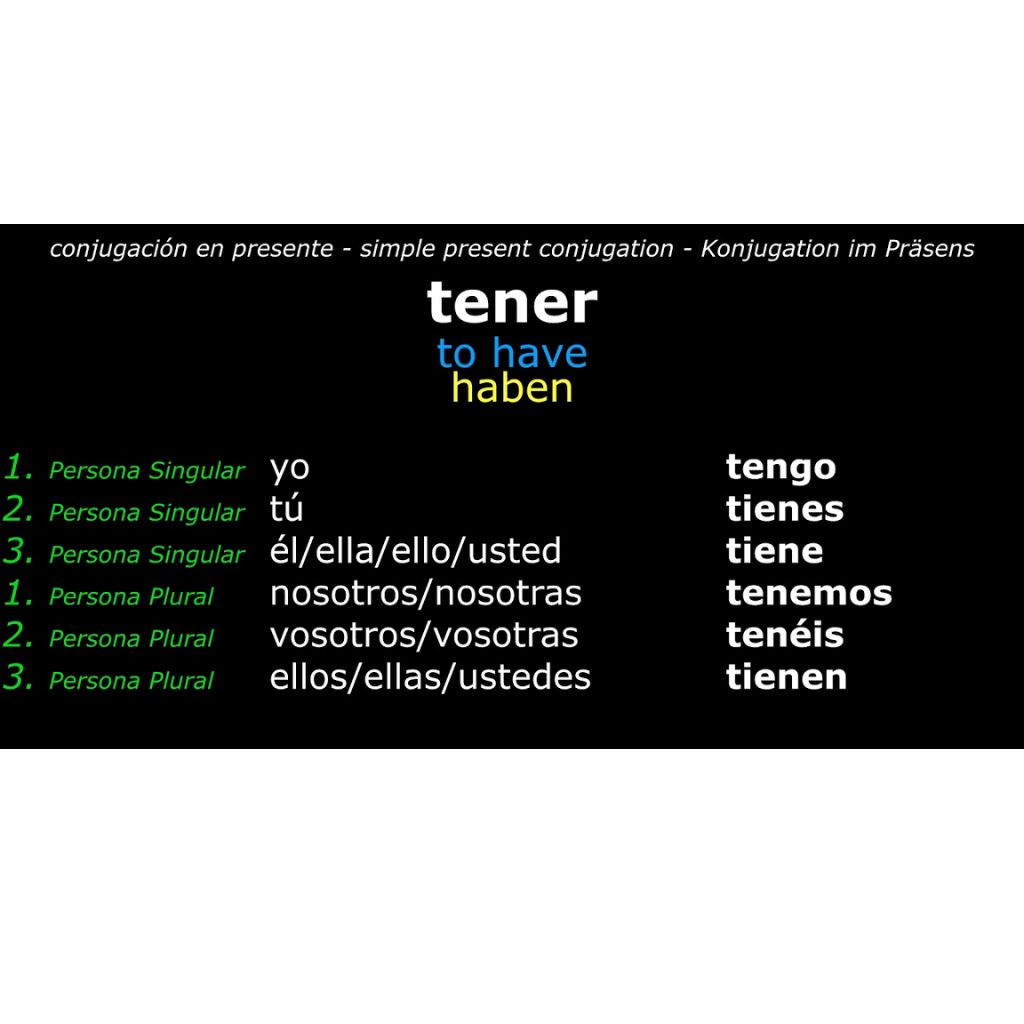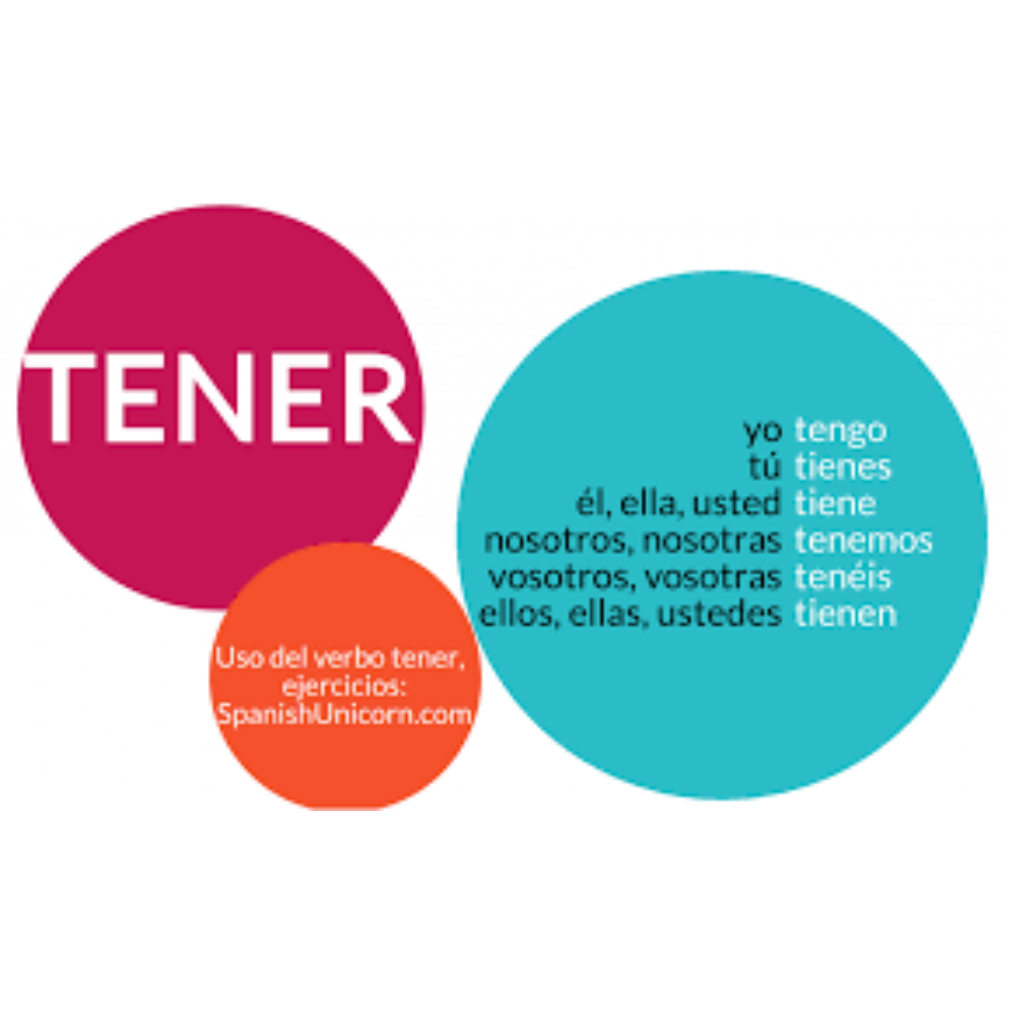Understanding Tener verb conjugation is crucial for expressing possession and various emotions in Spanish. Did you know that the Spanish verb “Tener” is one of the most commonly used verbs, yet many learners struggle with its conjugation? .
In this article, we’ll break down the different forms of “tener” and provide you with tips to master them. By the end, you’ll be equipped to confidently use this essential verb in your conversations.

1. Infinitive Form
The infinitive form of the Spanish verb “tener” is translated into English as “to have.” This is the base form of the verb and is used when the verb is not conjugated or when it follows another verb (especially modal verbs or verbs like “want,” “need,” or “like”).
Uses of the Infinitive “to have”:
- After modal verbs:
- I want to have a dog.
- She needs to have more time.
- They would like to have dinner with us.
- As the subject or object of a sentence:
- To have friends is important.
- It’s nice to have a break.
- In verb phrases (perfect infinitive):
- He seems to have forgotten.
- She claims to have seen the movie already.
Example Sentences:
- I hope to have a vacation next month.
- He promised to have everything ready by noon.
- To have good health is a true blessing.
2. Present Tense
In English, the present tense of “tener” is translated as “have” or “has”, depending on the subject. It expresses current possession, characteristics, relationships, or conditions.
Present Tense Conjugation of “To Have”:
| Subject | Conjugation |
|---|---|
| I | have |
| You | have |
| He/She/It | has |
| We | have |
| You (plural) | have |
| They | have |
Uses of the Present Tense “have/has”:
- To show possession:
- I have a car.
- She has a new phone.
- To describe relationships:
- They have two children.
- He has a brother.
- To indicate conditions or qualities:
- We have a problem.
- This place has a nice view.
- To express age (in Spanish, age uses “tener”):
- In Spanish: Tengo 25 años.
- In English: I am 25 years old.
(Note: English uses “to be” for age instead of “to have.”)
Example Sentences:
- I have an idea.
- She has a meeting at 3 p.m.
- We have some questions.
- He has a lot of experience.
3.Past Tense (Preterite)
In English, the past tense of “tener” is “had” for all subjects. It describes possession, experiences, or situations that occurred and ended in the past. This corresponds to the preterite tense in Spanish (e.g., tuve, tuviste, tuvo).
Past Tense Conjugation of “To Have”:
| Subject | Conjugation |
|---|---|
| I | had |
| You | had |
| He/She/It | had |
| We | had |
| You (plural) | had |
| They | had |
Uses of the Past Tense “had”:
- Past possession or conditions:
- I had a cold last week.
- They had a dog when they were kids.
- Experiences or events:
- She had a great time at the party.
- We had dinner at 7 o’clock.
- Obligations (past expressions like “had to”):
- I had to study for the exam. (Tener que → to have to)
Example Sentences:
- He had a red bike when he was little.
- We had three meetings yesterday.
- I had a lot of homework last night.
- They had to leave early.
4. Future Tense
In English, the future tense of “tener” is “will have” for all subjects. It’s used to talk about possession, responsibilities, or experiences that will happen later. This matches the Spanish futuro simple tense (e.g., tendré, tendrás, tendrá).
Future Tense Conjugation of “To Have”:
| Subject | Conjugation |
|---|---|
| I | will have |
| You | will have |
| He/She/It | will have |
| We | will have |
| You (plural) | will have |
| They | will have |
Uses of the Future Tense “will have”:
- Future possession or availability:
- I will have more time tomorrow.
- She will have her own office next month.
- Future experiences or plans:
- They will have a meeting on Friday.
- We will have dinner at 8.
- Future obligations (using “will have to”):
- You will have to work hard. (Tener que → to have to)
Example Sentences:
- I will have a new laptop soon.
- He will have a chance to speak.
- We will have a party next weekend.
- They will have to decide by tomorrow.
5. Conditional and Perfect Forms
This section covers two key English forms that correspond to different uses of “tener”:
- The Conditional Form → “would have” (used to express hypothetical or possible situations)
- The Perfect Form → “have had” (used to show completed actions or experiences)
A. Conditional: “Would Have”
This matches the condicional simple in Spanish (e.g., tendría, tendrías).
It describes imagined situations or things someone would have under certain conditions.
Conjugation:
| Subject | Conditional |
|---|---|
| I | would have |
| You | would have |
| He/She/It | would have |
| We | would have |
| You (plural) | would have |
| They | would have |
Example Sentences:
- I would have more free time if I finished earlier.
- She would have a dog if she weren’t allergic.
- They would have gone, but it was raining.
Spanish equivalent: Tendría más tiempo si terminara antes.
B. Perfect: “Have Had”
This matches the pretérito perfecto in Spanish (e.g., he tenido, has tenido).
It describes something that started in the past and is relevant now or just completed.
Conjugation:
| Subject | Present Perfect |
|---|---|
| I | have had |
| You | have had |
| He/She/It | has had |
| We | have had |
| You (plural) | have had |
| They | have had |
Example Sentences:
- I have had a long day.
- He has had that job for years.
- We have had several opportunities.
FAQs:
- What is the conjugation of tener?
The verb “tener” is an irregular verb in Spanish, meaning its conjugation doesn’t follow regular patterns. Here’s a breakdown of “tener” in several key tenses:
- What are the six conjugations?
In English, we have six different persons: first person singular (I), second person singular (you), third person singular (he/she/it/one), first person plural (we), second person plural (you), and third person plural (they). We must conjugate a verb for each person.
Conclusion:
The verb “tener” is an essential and irregular verb in Spanish that corresponds to “to have” in English. It is widely used to express possession, age, necessities, and obligations. Understanding its conjugation is important for forming statements in the present, past, future, conditional, and perfect tenses. Here’s a quick recap:
- Present: I have, you have, he/she/it has, we have, they have
- Past (Preterite): I had, you had, he/she/it had, we had, they had
- Future: I will have, you will have, he/she/it will have, we will have, they will have
- Conditional: I would have, you would have, he/she/it would have, we would have, they would have
- Present Perfect: I have had, you have had, he/she/it has had, we have had, they have had

